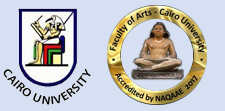عنوان المقال عربي
التناول المسرحي وعبر الثقافي في السينما لکوميديا موليير
Document Type
Original Study
Keywords English
Theater, adaptation, Cinema, intercultural, Intermediality, Molière
كلمات مفتاحية عربي
مسرح, اقتباس, سينما, عبر ثقافي, عبر نوعي, موليير
Abstract English
The French classical repertoire was, until the 1960s of the 20th century, an important vector of Egyptian dramatic and cinematographic adaptations for both historical and cultural reasons. Establishing from the credits a hypertextual relationship with French comedy, the screenwriter and director of the Egyptian film entitled Qissa Mamnou’a (Forbidden Story) identify it as a transposition of Molière’s L’Ecole des femmes. Consequently, this film deserves to be the object of a reading adopting a transcultural and comparative approach to reflect on questions such as the process of reappropriation which leads to discovering the dynamics generated between the work and the cultural context of its reception. The analysis of the film sequences of this artwork makes it possible to identify some clues of theatricality reflecting a preference for the use of scenographic language in the production of the movie. The observation of these extracts illustrates the liberation of the film from its attachment to the principle of fidelity to the original work, thus offering the possibility of presenting a new interpretation of the chronotopic framework in which the traditional trio of characters evolve. The selected scenes underline the gap between the original intention of the French comedy and the specific means of the target culture: the Egyptian film modifies the French source to extract only a few elements used in the service of stereotypes concerning women, love and marriage in Egyptian society at the time.
الملخص العربي
حتى الستينيات من القرن الماضي شکلت الدراما الفرنسية الکلاسيکية مصدر مهم للاقتباس الدرامي والسينمائي المصري ، ويرجع ذلک لأسباب تاريخية وثقافية. يعترف بل ويفتخر کاتب ومخرج الفيلم المصري "قصة ممنوعة" - في تتر العمل - أنه مقتبس من المسرحية الکوميدية "مدرسة النساء" لموليير والتي وصفها بأنها تنتمي للتراث العالمي. لذلک يستحق هذا الفيلم قراءة سميوطيقية متعمقة باستخدام منظور عبر ثقافي ومقارن للتفکير في قضايا مثل عملية إعادة التناول التي تساعد في اکتشاف مساحات التقاطع بين العمل الدرامي والمنتج السينمائي ، و الديناميکية المعقدة التي تتولد بين العمل والسياق الثقافي للمشاهد. يسمح تحليل مقاطع من هذا الفيلم بتحديد بعض الدلالات المسرحية التي تعکس تفضيلا لاستخدام لغة الاخراج المسرحي في صناعة بعض الأفلام في ذلک الوقت. دراسة هذه المقتطفات توضح تحرر الفيلم من الالتزام بمبدأ الإخلاص أو التبعية الکاملة للعمل الأصلي، مما يتيح الفرصة لطرح تفسير مختلف وجديد للأدوات المستخدمة في التعبير عن الإطار الزمکني الذي يعيش فيه الثلاثي التقليدي للشخصيات. تبرز المشاهد المختارة سعة الفجوة بين العمل الدرامي الأصلي والوسائل الخاصة المستخدمة للتأقلم مع الثقافة المستهدفة : يقوم کاتب ومخرج الفيلم المصري بتحوير حبکة المسرحية الفرنسية لتخدم عرضه لصور نمطية عن الحب والزواج والمرأة في المجتمع المصري في ذلک الوقت.
Recommended Citation
ZAKI, Heïdi Sami
(2021)
"Theatricality and interculturality in the cinematographic treatment of Molière’s comedy,"
Journal of the Faculty of Arts (JFA): Vol. 81:
Iss.
4, Article 24.
DOI: 10.21608/jarts.2021.209847
Available at:
https://jfa.cu.edu.eg/journal/vol81/iss4/24
Digital Object Identifier (DOI)
10.21608/jarts.2021.209847
Accept Date
2021-12-19
Publication Date
10-1-2021

